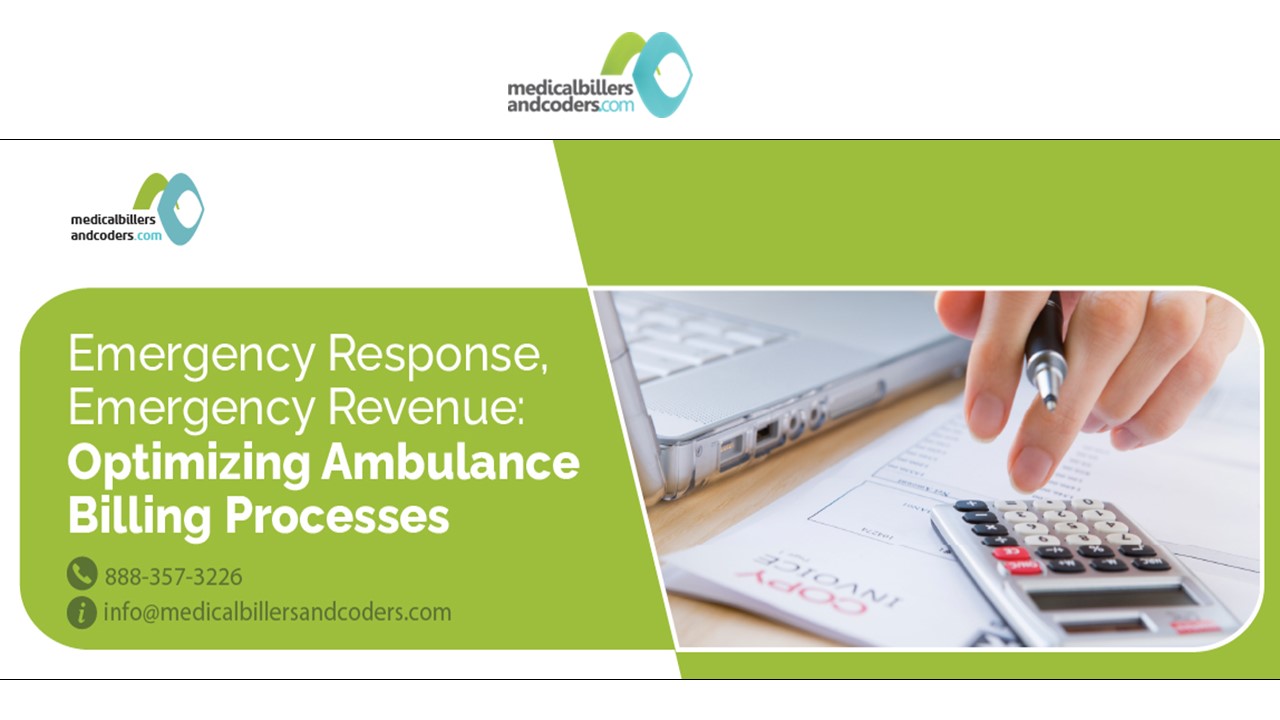Emergency Response, Emergency Revenue: Optimizing Ambulance Billing Processes
Title:
Emergency Response, Emergency Revenue: Optimizing Ambulance Billing Processes
Description:
Are inefficient billing processes affecting your ambulance services' revenue? Discover effective strategies for optimizing ambulance billing. –
Number of Views:0
Date added: 10 January 2025
Slides: 8
Provided by:
Username withheld or not provided
Category:
Other
Tags:
Title: Emergency Response, Emergency Revenue: Optimizing Ambulance Billing Processes
1
(No Transcript)
2
Emergency Response, Emergency Revenue
Optimizing Ambulance Billing Processes
Can Optimizing Ambulance Billing Unlock Your
Revenue Potential? Lets Find Out! In the world
of emergency medical services, every second
counts but what about the revenue generated from
those crucial responses? Are your ambulance
billing processes streamlined to ensure maximum
revenue collection? Optimizing ambulance billing
is essential for improving cash flow as well as
sustaining high-quality patient care. Ambulance
services face unique challenges, including
complex billing codes, insurance regulations, and
changing reimbursement models. A study from the
American Ambulance Association revealed that
improper billing could cost EMS agencies millions
annually. Thus, understanding the intricacies of
ambulance billing services is crucial for
financial health and sustainability. Understandin
g Revenue Cycle Management (RCM) in Ambulance
Billing Revenue cycle management (RCM) plays a
pivotal role in optimizing ambulance billing. RCM
encompasses the entire billing process, from
patient registration to final payment. This
process includes several key performance
indicators (KPIs) that are essential to monitor
3
Emergency Response, Emergency Revenue
Optimizing Ambulance Billing Processes
1. Days in Accounts Receivable (AR) Measures the
average time taken to collect payment.
Formula Total Accounts Receivable / Average
Daily Charges. 2. Clean Claim Rate The
percentage of claims accepted without any errors
on first submission. Formula Clean Claims /
Total Claims Submitted. 3. Denial Rate The
percentage of claims denied by payers.
Formula Denied Claims / Total Claims
Submitted. Tracking these KPIs enables ambulance
services to identify areas of improvementthereby
optimizing their billing processes. By
understanding where inefficiencies lie, providers
can implement targeted strategies to enhance
their revenue cycle, reduce claim denials, and
improve cash flow. 5 Proven Strategies for
Optimizing Ambulance Billing 1. Leverage
Technology Utilize billing software that
integrates directly with electronic health
records (EHR) systems. This facilities seamless
data transfer and reduces manual entry errors.
Set up automated alerts within the software to
flag potential coding issues or missing
documentation before claims are
submittedminimizing risk of denials.
4
Emergency Response, Emergency Revenue
Optimizing Ambulance Billing Processes
2. Training and Education Create a structured,
ongoing training program that includes monthly
updates on new regulations or payer policies,
ensuring staff are always compliant with the
latest standards. Implement competency tests
after training sessions to verify staff
understanding and immediately address any gaps in
knowledge. 3. Focus on Documentation Establish
standardized templates for ambulance reports that
prompt field personnel to capture all necessary
details, such as medical necessity and mileage,
which are critical for clean claims. Implement
regular audits of documentation to identify
recurring issues and provide corrective feedback
to staff in real time. 4. Streamline Claim
Submissions Implement a batching process for
claims submissions, ensuring that claims are
grouped and sent at optimal times for faster
processing. Utilize clearinghouses to pre-scrub
claims for common errors, reducing the chance of
denials and speeding up the reimbursement
cycle. 5. Engage with Payers
5
Emergency Response, Emergency Revenue
Optimizing Ambulance Billing Processes
Schedule quarterly meetings with major insurance
payers to discuss common reasons for denials and
explore ways to streamline claims processing.
Build a dedicated liaison team within your
organization to manage payer relationships,
ensuring timely resolution of claims disputes and
better overall communication. Outsourcing
to Experts A Smart Solution for Optimizing
Ambulance Billing Partnering with a reputable
billing service like Medical Billers and Coders
(MBC) can be a game-changer. MBC specializes in
optimizing revenue cycle management for ambulance
services. Benefits of outsourcing ambulance
billing services include
6
Emergency Response, Emergency Revenue
Optimizing Ambulance Billing Processes
- Save Time and Reduce Stress Focus on providing
quality care while MBC handles complex billing
tasks. - Maximize Accuracy and Collections Ensure
accurate billing, which translates to higher
collections. - Data-Driven Insights Leverage data analysis to
benchmark performance and identify areas for
growth. - Standardized Processes Benefit from streamlined
documentation and billing procedures. - Dedicated Support Get personalized service with
a dedicated account manager offering regular
updates. - Technology Integration MBC is system-agnostic
and works seamlessly with your existing software. - Optimize Your Ambulance Billing Efficiency Before
It's Too Late! - Dont let inefficient billing drain your
revenuereach out to MBC today and secure your
financial future. - FAQs
- Q What are the most common challenges in
ambulance billing? - A Common challenges include complex coding, high
denial rates, and inefficient claim processing,
which can hinder revenue collection.
7
Emergency Response, Emergency Revenue
Optimizing Ambulance Billing Processes
Q What is the code for ambulance billing? A
Ambulance billing typically uses the HCPCS codes,
starting with "A" for ambulance services, such as
A0428 for basic life support transport. Q What
is the CPT code for ambulance mileage? A The
CPT code for ambulance mileage is A0425, which
accounts for mileage per mile for ambulance
transportation. Q What are the compliance
regulations for ambulance billing? A Ambulance
billing must comply with Medicare, Medicaid, and
private payer guidelines, including correct
coding and documentation to avoid penalties and
denials. Q Where can you get detailed and
accurate information related to ambulance
billing? A You can find detailed and accurate
information on ambulance billing through the
Centers for Medicare and Medicaid Services (CMS)
guidelines or reputable billing resources like
American Medical Association (AMA).































